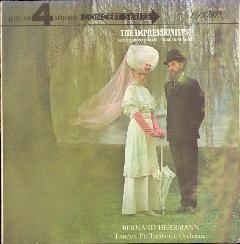The Impressionists (1971)
The Impressionists (1971)

01. Gymnopedies I & II (Satie) 02. Clair De Lune (Debussy) 03. Valse 'La Plus Que Lante' (Debussy) 04. Five O'Clock Foxtrot (Ravel) 05. Pavane (Faure) 06. Pastorale D'Ete (Honegger) London Philharmonic Orchestra Bernard Herrmann – conductor Recorded at Kingsway Hall, London, 21 December, 1970
Since this assortment of French music is labelled "The Impressionists" on the sleeve, my first instinct was to turn to the literature provided with the record to see what well-chosen words Decca had used to justify the epithet. What I read was not very convincing. I fail to see how it could be, for not one of these pieces could be even remotely considered 'impressionistic'. Mr David Simmons, the writer of the notes, himself refers to the 'cubist' manner of Satie's 'sarabande-type' Gymnopedies: dance forms like the sarabande, waltz, fox-trot and pavane are by their very nature unimpre.ssionistic' ; and Clair de lune happens to be early and quite un-'impressionistic' Debussy. This leaves only Honegger's Pastorale d'ete, a charming but very solidly constructed piece in ternary form, as the sole contender for the impressionist title.
In his discursive note, Mr Simmons does not identify the Lab o he quotes on Brahms • composer Edouard ? or his critic son Pierre? Accents are missing or wrong, and the names of Colette and Roger Branga are mis-spelt. Branga was the anagrammatic pseudonym of Ravel's friend (Lucien) Garban. Indeed, the whole paragraph dealing with Ravel's Five o'clock foxtrot deserves quotation : "This [L'enfant et les sortileges] uses a tale by Collette about a mischievous child who after getting himself actively involved with the crockery and furniture, after a show of defiance he goes into the garden and tries to mix with the unexpected life he encounters there. Eventually, after many adventures, he is returned to his mother. On this record, the fox-trot, Five o'clock is a reworking of the episode when the little Chinese boy suddenly appears. The arrangment played here, was made with the full approval of Ravel by his friend Roger Brange". I doubt if the immortal Charley could have produced a stranger synopsis of the opera or commentary on the fox-trot dialogue between the black Wedgewood teapot and the Chinese teacup.
Turning to the music, I find the Ravel and Honegger fare best, though the whole record lacks finesse, the sound generally being close and gross. Greater distance would certainly have enhanced all these pieces, for this is music observed rather than music entered. Debussy's orchestrations of Satie and of his own La plus que lente . . . (with a cimbalon part) really need a little space between the listener and the music. So, too, does Caplet's orchestration of Debussy's Clair de lune, for, immediately after the opening strain, the score becomes sultry and over-laden until it thins again. Turning down the volume is no real cure for this kind of close recording.
By far the worst feature of this selection is the complete misinterpretation of Faure's Pavane. It takes Mr Herrmann more than eight minutes. What should be wistful and nonchalant becomes sluggish and sentimental, with Faures dynamic markings and gradations largely ignored, and, worse, a final rallentando which the composer would certainly not have tolerated. Even if this were not a question of tradition—there is at least one eminent English octogenarian alive who remembers Faure playing his Pavane on more than one occasion—the text set for an ad libitum vocal quartet should provide a clue to the right tempo; at Mr Herrmann's, Faure's mock-FetesGalantes Verlaine would sound about as lively as a plainsong cantus firmus. How apt that in the middle section, where no change of time is indicated, the words are : "Observez la mesure! 0 la mortelle injure! La cadence est moms lente ! Et la chute plus sure !" Could Faure have been thinking of future conductors of the Pavane? F.A., gramophone.net
download: uploaded anonfiles yandex 4shared solidfiles mediafire mega filecloudio
Last Updated (Thursday, 17 October 2013 12:15)








